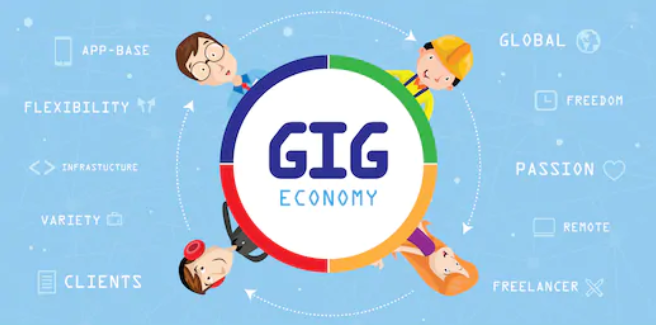Have you ever heard of the ‘Gig’ economy? Gig economy is a newly-coined word that combines the word ‘economy’ with the word ‘gig’ which was used to call a temporary work around the American Jazz concert in the 1920s when people were called to play music on the spot. Currently, the way workers seek jobs through digital platforms driven by the development of digital technology is widespread around the world. Examples of such gig economy includes not only delivery and quick service, but also housekeeping, nursing, and security service. Gig economy is now spreading around the world-wide service market. It takes the form of employment in which companies utilize workers as contract workers, not in the traditional way of employing workers as full-time, or even part-time, employees and paying monthly salaries. Let’s find out about the eyes on the gig economy.
Gig Economy, the Dark Side of Our Future?
Before the Industrial Revolution, most people worked multiple jobs just to make ends meet. However, the growing demand for full-time workers after the Industrial Revolution led to more stable jobs in the form of long-term employment. As a result, we have become accustomed to the term “lifetime workplace”. But as time went by, the work force has changed again. Robin Chase, co-founder of the car-sharing company Zipcar, says, “My father had one job in his life, I’ve had six in mine, my kids will have six at the same time”. In 2018, Oxford University in the U.K. released a study that found working conditions in a gig economy could negatively affect employees’ well-being. In return for the flexibility and autonomy of work in a gig economy, people will have long, irregular and competitive high-strength labor. In addition, as gig workers are not recognized the same as full-time workers under the Labor Standards Act, they are placed in a blind spot for social insurance.
On the other hand, there are also opinions that a gig economy will destroy existing jobs. On February 1st, 2019, ride-sharing services Uber and Cabify were shut down in Barcelona, Spain. It was due to resistance from those working at existing taxi companies. They even staged demonstrations in Spain’s capital, Madrid as well as in Barcelona, starting in August 2018. It was feared that the ride-sharing service would deprive existing taxi drivers of their jobs. Eventually, the Spanish government began regulating ride-sharing services in January 2019. Agig economy hires workers when necessary, which can cause drastic flexibility in the labor market, hurting the stability of existing full-time workers.
Gig Economy, a Way to Find Professional Personnel?
However, a gig economy can be a big help for companies to find professionals more easily. The Boston Consulting Group(BCG) said the labor force traded through a gig economy platform is evolving into a task that requires trained professionals beyond the simple tasks of delivering and driving of the existing ride-sharing services. This suggests that the proportion of freelance contracts or gig workers will increase among each company’s hiring methods. In other words, “new freelancers” with high-skilled expertise as well as low-wage and low-skilled freelancers are trading their labor in the gig economy market. According to BCG, new freelancers are engaged in economic activities in a variety of areas including construction, real estate, education, finance, insurance, manufacturing, and software development. In particular, 9% of workers in the information-related industry including media, telecommunications, and data processing use the gig economy platform as their main source of income. In addition, 24% of workers in the information-related industry are trading their labor on the gig economy platform, totaling up to 33% of those people in the information-related industries. The flexibility of the labor market due to the gig economy allows companies to find the people they want as needed. Also, workers can choose companies according to their own required conditions.
Both expectations and tensions over the arrival of a gig economy continue around the world. A gig economy is a great conduit for each company to reinforce its professional workforce. However, even if the proportion of gig workers, or freelancers, increases in the form of gig economy, this means workers’ dismissal would likely to be less protected than before. As freelancers are not officially part of the company, they cannot even consider earning benefits, such as insurance, that the company must provide for its full-time workers. This will be very profitable for companies, but a major liability part for the laborers. Agig economy is expected to spread at a faster pace in the modern era, which has enjoyed generalized digital technology and the resulting convenience. Now, it is the time for specific and reasonable regulations to be settled and attention to the welfare of workers.


